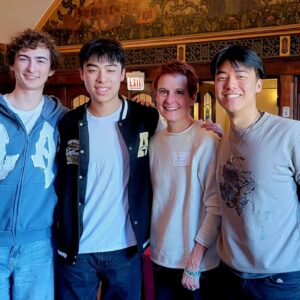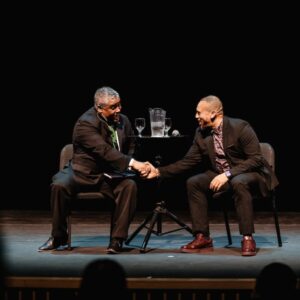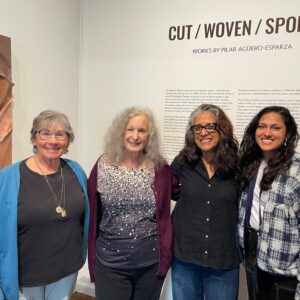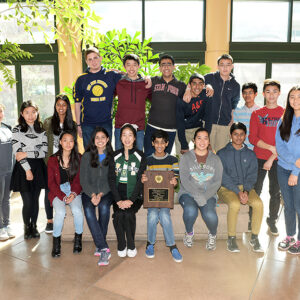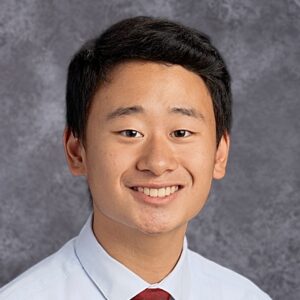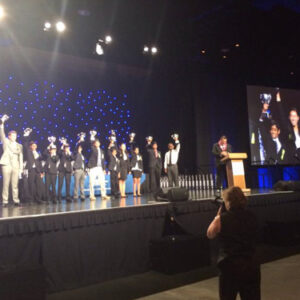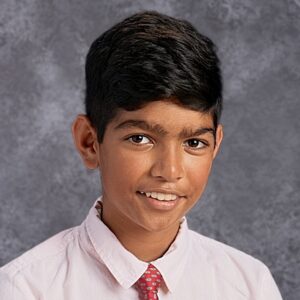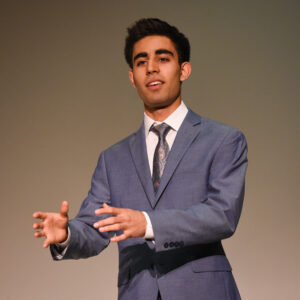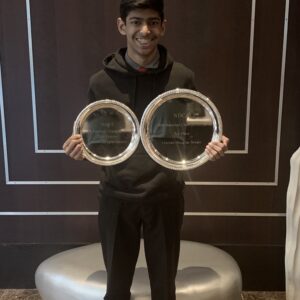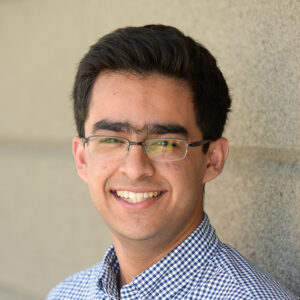This article originally appeared in the summer 2015 Harker Quarterly.
By Jenny Alme and Greg Achten
Speech and debate participants reap many benefits, including enhanced critical-thinking, high-level research skills and many more, but one often overlooked benefit is the growth of students’ leadership skills.
Students who participate in middle and upper school speech and debate (also called forensics) competitions not only learn teamwork skills and the value of hard work, many of those students also take on impressive leadership roles that prepare them for success long after they leave Harker.
On any team, whether athletic or academic, there are always team leaders, and the speech and debate team is no exception. Many older, more experienced students serve as team captains or mentors for the younger students and in so doing learn important leadership skills. These students are tasked with organizing research assignments, judging novice debates and generally assisting the coaches both at tournaments and at school in team preparation and management.
Leadership on the Team
Experienced speech and debate team members often note they were grateful for the help they received from varsity team members and are eager to give back. They can also gain valuable skills from mentoring. Nitya Mani, grade 12, a captain from the 2014-15 team, said teaching was one of the best ways to learn. The mentors have to learn how to explain concepts clearly and relate to younger students.
Thinking about how to teach a concept gives the mentor a deeper understanding. In the process, they also are practicing the audience adaptation and argumentation skills that will help them be successful at competitions.
“Through leading our team’s research efforts, working with novices and middle schoolers, and helping the rest of the team improve, debate has allowed me to hone my leadership skills,” said Ayush Midha, grade 12, also a captain and winner of the 2014-15 O’Neill Leadership Trophy, an annual award given to a single student who best represents the attributes a national committee of coaches desires in a student role model.
“As a captain,” he added, “I have had the opportunity to foster team success and lead my teammates by example. Even outside of debate, these skills have allowed me to take on leadership positions and experience success.”
The coaches enjoy watching the older students grow into these roles. Seeing a nervous and inexperienced sixth grader evolve into a confident varsity team leader is deeply gratifying.
“The middle school team is extremely lucky to have our experienced upper school debaters come to the middle school and act as coaches, judges and great role models,” said Karina Momary, head coach of the middle school program.
“It is fantastic to see students who started participating in speech and debate in middle school come back as juniors and seniors to be student coaches. They not only are able to help the middle school students but also themselves grow through teaching their younger teammates.”
Leadership in the Harker Community
Team members also often speak of the skills that the speech and debate program contributed to other aspects of life at Harker. Whether they are writing a research paper, presenting science research or speaking in class, debate coaches often hear that students attribute some of their success to speech and debate.
Megan Huynh, grade 9, noted that speech and debate helped her to run for student council because she felt that she could confidently deliver her campaign speech.
Less tangibly, students also learn to accept constructive criticism and bounce back after failures. Team member will all say that competitions are not easy and that before winning major trophies, they had to lose lots of rounds and be critiqued by judges from every angle. Learning to absorb these comments and turn them into better performances can help a student learn to run for office again after losing an election, work harder on a project after receiving a low grade or try something new.
“Debate has really taught me that failure is not the end of the world and that when you fail, you just have to shake it off and move on,” said Panny Shan, grade 11. “Last year, I was devastated every time I lost a debate round, but this year I’ve learned to focus on what I learned from a debate instead of the win or loss.”
Leadership After Harker
While the skills and lessons certainly help them win competitions and do well in school, speech and debate team skills also serve students long after they have graduated. Many alumni attest that their participation in middle and upper school forensics was a formative experience that helped shape their collegiate and professional careers.
“Debate requires you to work closely with a team of peers in high-pressure situations and be fully committed to the success of the team,” said Roshni Bhatnagar ’11, a rising medical school student at Northwestern University. “There’s no better way to practice effective leadership and teamwork skills.” Other alumni note the critical impact speech and debate had on their already- remarkable careers.
“Debate was perhaps the most valuable aspect of my formal education,” said Alex Iftimie ’03, now counsel to the assistant attorney general for national security at the U.S. Department of Justice. “Leaving aside the oft-cited points that debate teaches critical- thinking and communication skills, debate taught me to be a competitor – to have the drive and determination to succeed – and instilled a confidence that I could reason my way through any legal or policy issue.”
Ziad Jawadi ’11 just graduated from Georgetown University and is about to start his consulting career at Bain & Co. in Dubai. “Debate was, by far, the activity that most prepared me for collegiate and career success,” he noted. “In college, I excelled at writing and analytical thinking early on due to the preparation debate offered, as many of the skills directly mirrored what I had to do for class.
“When I began recruiting for consulting, many of the skills that Bain was looking for in students were the exact skills that debate trains for: research, analytical thinking, writing, public speaking, and the ability to effectively communicate complex public policy and economic concepts into lay terms.”
Helping Build Future Leaders
While the Harker speech and debate team is certainly successful year in and year out and brings great acclaim – along with lots of trophies – to the school, perhaps its greatest accomplishment is the lifelong skill set it imparts on students. As the testimonials of current and former debaters demonstrate, Harker’s forensics program plays a vital role in helping students prepare to be effective leaders.
“Speech and debate has helped me in a lot of different ways,” said Frank Wang ’08, a doctoral candidate at MIT in computer science. “Most of the research I do requires positioning my research in a way that’s attractive to reviewers. Many Ph.D. students spend the first two years trying to learn that, but I had a head start on that. Speech and debate has made me a better researcher and a better leader.”
Reddy Declared National Champ for Second Year!
For the second year in a row, Pranav Reddy, grade 12, was named the national Lincoln-Douglas Debate Champion. The tournament, hosted by the National Debate Coaches Association (NDCA), was held in Las Vegas April 11-13.
Reddy’s winning debate was on the topic of minimum wage and whether it should be substantially increased. The senior successfully affirmed the proposal.
In 2013-14 Reddy became the first Harker Lincoln-Douglas debater to win the prestigious NDCA National Championships. Reddy built on this success his senior year, being named the top speaker at five of the first six tournaments he attended and winning the Glenbrooks tournament in November, the largest tournament of the fall semester.
Reddy entered the 2014-15 debate season as the No. 1-ranked Lincoln-Douglas debater in the nation and won two national titles in April – the NDCA National Championships and the Tournament of Champions. Reddy also won the Harvard-Westlake tournament in January and entered the championship season as the only student to win two majors in the regular season. He is the first student ever to win the NDCA National Championships twice. Reddy is also only the second student in the history of Lincoln-Douglas debate to win the NDCA National Championships and the Tournament of Champions in the same year.
“His achievements are truly historic,” said Greg Achten, Harker’s Lincoln-Douglas team coach. “Winning one national championship tournament takes hard work, incredible intellectual range and exceptional speaking skills. To win three national titles over the course of two years is simply an unheard of accomplishment. In the history of Lincoln-Douglas debate, no student from any school has ever achieved this level of success.” For the full story on the debate teams tremendous season go to news.harker.org and search on “debate.”

